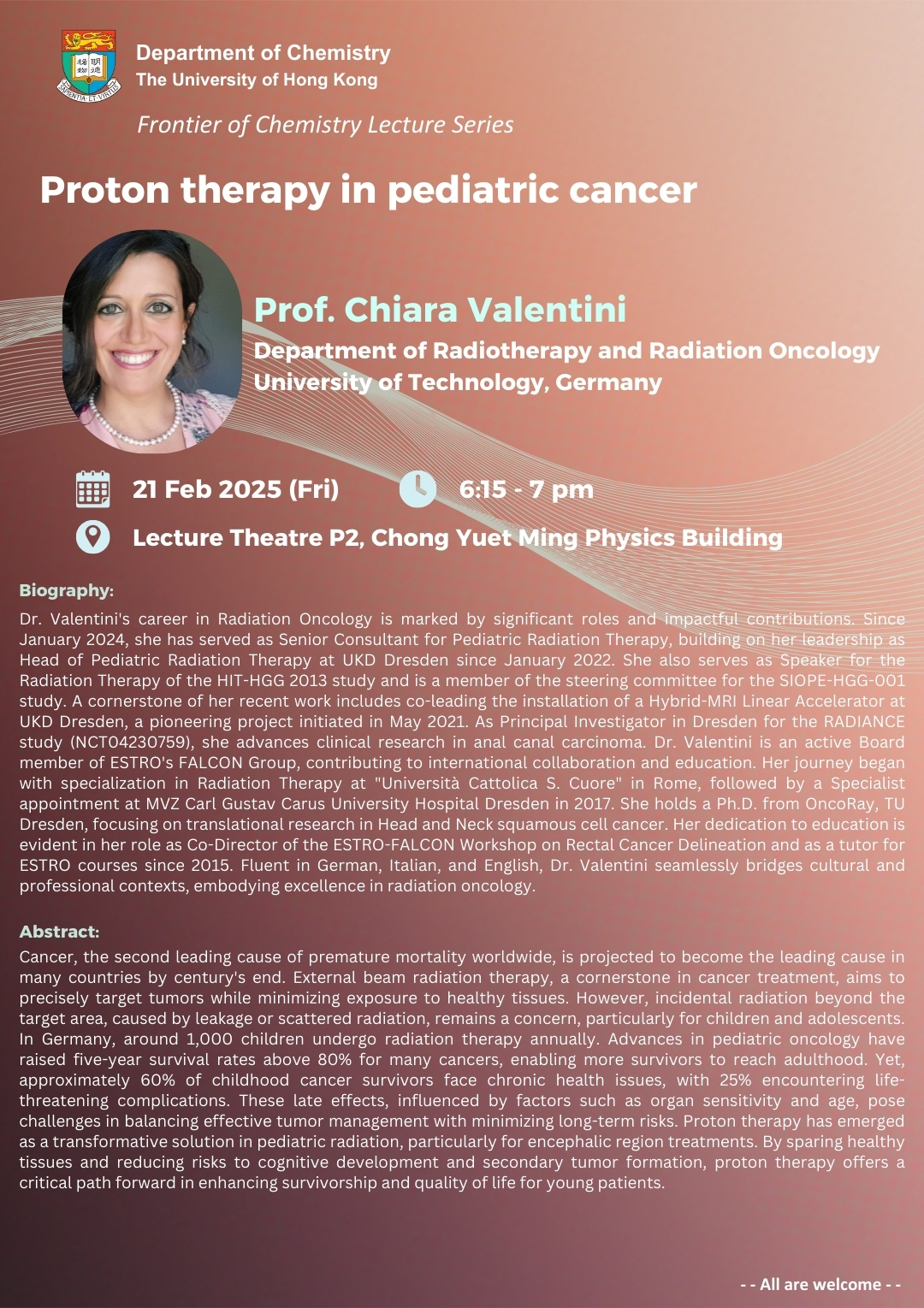| Date | 21 Feb 2025 |
| Time | 6:15 pm - 7:00 pm (HKT) |
| Venue | Lecture Theatre P2, Chong Yuet Ming Physics Building |
| Speaker | Prof. Chiara Valentini |
| Institution | Department of Radiotherapy and Radiation Oncology, University of Technology, Germany |

Title:
Proton therapy in pediatric cancer
Schedule:
Date: 21st February, 2025 (Friday)
Time: 6:15 - 7 pm (HKT)
Venue: Lecture Theatre P2, Chong Yuet Ming Physics Building
Speaker:
Prof. Chiara Valentini
Department of Radiotherapy and Radiation Oncology
University of Technology, Germany
Biography:
Dr. Valentini's career in Radiation Oncology is marked by significant roles and impactful contributions. Since January 2024, she has served as Senior Consultant for Pediatric Radiation Therapy, building on her leadership as Head of Pediatric Radiation Therapy at UKD Dresden since January 2022. She also serves as Speaker for the Radiation Therapy of the HIT-HGG 2013 study and is a member of the steering committee for the SIOPE-HGG-001 study. A cornerstone of her recent work includes co-leading the installation of a Hybrid-MRI Linear Accelerator at UKD Dresden, a pioneering project initiated in May 2021. As Principal Investigator in Dresden for the RADIANCE study (NCT04230759), she advances clinical research in anal canal carcinoma. Dr. Valentini is an active Board member of ESTRO's FALCON Group, contributing to international collaboration and education. Her journey began with specialization in Radiation Therapy at "Università Cattolica S. Cuore" in Rome, followed by a Specialist appointment at MVZ Carl Gustav Carus University Hospital Dresden in 2017. She holds a Ph.D. from OncoRay, TU Dresden, focusing on translational research in Head and Neck squamous cell cancer. Her dedication to education is evident in her role as Co-Director of the ESTRO-FALCON Workshop on Rectal Cancer Delineation and as a tutor for ESTRO courses since 2015. Fluent in German, Italian, and English, Dr. Valentini seamlessly bridges cultural and professional contexts, embodying excellence in radiation oncology.
Abstract:
Cancer, the second leading cause of premature mortality worldwide, is projected to become the leading cause in many countries by century's end. External beam radiation therapy, a cornerstone in cancer treatment, aims to precisely target tumors while minimizing exposure to healthy tissues. However, incidental radiation beyond the target area, caused by leakage or scattered radiation, remains a concern, particularly for children and adolescents. In Germany, around 1,000 children undergo radiation therapy annually. Advances in pediatric oncology have raised five-year survival rates above 80% for many cancers, enabling more survivors to reach adulthood. Yet, approximately 60% of childhood cancer survivors face chronic health issues, with 25% encountering life-threatening complications. These late effects, influenced by factors such as organ sensitivity and age, pose challenges in balancing effective tumor management with minimizing long-term risks. Proton therapy has emerged as a transformative solution in pediatric radiation, particularly for encephalic region treatments. By sparing healthy tissues and reducing risks to cognitive development and secondary tumor formation, proton therapy offers a critical path forward in enhancing survivorship and quality of life for young patients.
- - ALL ARE WELCOME - -
